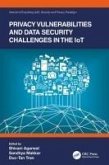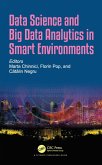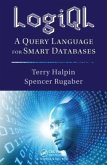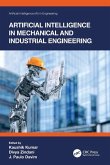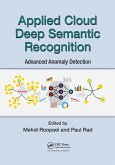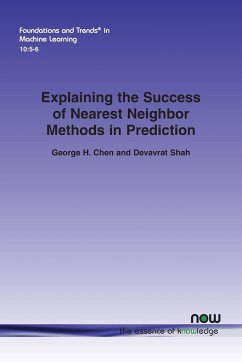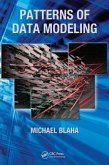Cancer Prediction for Industrial IoT 4.0
A Machine Learning Perspective
Herausgeber: Gupta, Meenu; Solanki, Arun; Jain, Rachna
Cancer Prediction for Industrial IoT 4.0
A Machine Learning Perspective
Herausgeber: Gupta, Meenu; Solanki, Arun; Jain, Rachna
- Broschiertes Buch
- Merkliste
- Auf die Merkliste
- Bewerten Bewerten
- Teilen
- Produkt teilen
- Produkterinnerung
- Produkterinnerung
This book presents the developments in machine learning with data mining, and their influence in Industrial IoT 4.0 for cancer prediction. It is aimed primarily at graduates and researchers working in machine learning and data mining. Researchers and healthcare specialists studying cancer will also find this book useful.
Andere Kunden interessierten sich auch für
![Privacy Vulnerabilities and Data Security Challenges in the Iot Privacy Vulnerabilities and Data Security Challenges in the Iot]() Privacy Vulnerabilities and Data Security Challenges in the Iot78,99 €
Privacy Vulnerabilities and Data Security Challenges in the Iot78,99 €![Data Science and Big Data Analytics in Smart Environments Data Science and Big Data Analytics in Smart Environments]() Data Science and Big Data Analytics in Smart Environments80,99 €
Data Science and Big Data Analytics in Smart Environments80,99 €![LogiQL LogiQL]() Terry HalpinLogiQL88,99 €
Terry HalpinLogiQL88,99 €![Artificial Intelligence in Mechanical and Industrial Engineering Artificial Intelligence in Mechanical and Industrial Engineering]() Artificial Intelligence in Mechanical and Industrial Engineering68,99 €
Artificial Intelligence in Mechanical and Industrial Engineering68,99 €![Applied Cloud Deep Semantic Recognition Applied Cloud Deep Semantic Recognition]() Applied Cloud Deep Semantic Recognition60,99 €
Applied Cloud Deep Semantic Recognition60,99 €![Explaining the Success of Nearest Neighbor Methods in Prediction Explaining the Success of Nearest Neighbor Methods in Prediction]() George H. ChenExplaining the Success of Nearest Neighbor Methods in Prediction114,99 €
George H. ChenExplaining the Success of Nearest Neighbor Methods in Prediction114,99 €![Patterns of Data Modeling Patterns of Data Modeling]() Michael BlahaPatterns of Data Modeling77,99 €
Michael BlahaPatterns of Data Modeling77,99 €-
-
-
This book presents the developments in machine learning with data mining, and their influence in Industrial IoT 4.0 for cancer prediction. It is aimed primarily at graduates and researchers working in machine learning and data mining. Researchers and healthcare specialists studying cancer will also find this book useful.
Hinweis: Dieser Artikel kann nur an eine deutsche Lieferadresse ausgeliefert werden.
Hinweis: Dieser Artikel kann nur an eine deutsche Lieferadresse ausgeliefert werden.
Produktdetails
- Produktdetails
- Verlag: Taylor & Francis Ltd (Sales)
- Seitenzahl: 203
- Erscheinungstermin: 9. Oktober 2024
- Englisch
- Abmessung: 254mm x 178mm x 12mm
- Gewicht: 386g
- ISBN-13: 9781032028798
- ISBN-10: 1032028793
- Artikelnr.: 71644435
- Herstellerkennzeichnung
- Libri GmbH
- Europaallee 1
- 36244 Bad Hersfeld
- gpsr@libri.de
- Verlag: Taylor & Francis Ltd (Sales)
- Seitenzahl: 203
- Erscheinungstermin: 9. Oktober 2024
- Englisch
- Abmessung: 254mm x 178mm x 12mm
- Gewicht: 386g
- ISBN-13: 9781032028798
- ISBN-10: 1032028793
- Artikelnr.: 71644435
- Herstellerkennzeichnung
- Libri GmbH
- Europaallee 1
- 36244 Bad Hersfeld
- gpsr@libri.de
Dr. Meenu Gupta completed her PhD in Computer Science & Engineering with emphasis on Traffic Accident Severity problem from the Ansal University, Gurugram, India (2020), an M.Tech in Computer Sceince & Engineering from the M.D. U University, Rohtak, India (2010), and she graduated in Information Technology at the K.U.K University, Kurukshetra, India (2006). She is currently Associate Professor in Chandigarh University. She has 13 years of teaching experience. Her area of research are Machine Learning, Intelligent Systems, Data mining, with specific interest in, Artificial Intelligence, Image Processing and Analysis, Smart cities, Data Analysis, and human/brain-machine interaction. She also submitted one edited book of CRC press on Healthcare. She also have 4 authored book on engineering stream. She worked as a reviewer of many journal like, Big Data, CMC, Scientific Report, TSP, etc. She is a life member of ISTE and IAENG. She has authored or co-authored over 50 papers in refereed international journals (SCI/SCIE/WoS/Scopus/etc.), conferences, and more than 20 book chapters. She also chair IEEE international Conference and convened many workshop/FDP. Dr. Rachna Jain, currently working as Assistant Professor(Computer Science Department) in Bharati Vidyapeeth's College of Engineering (GGSIPU) since 2007.She did her PHD from Banasthali Vidyapith in Computer Science in 2017.She received ME degree in year 2011 from Delhi college of engineering (Delhi University) with specialisation in Computer Technology and Applications. She did her B.tech (Computer Science) in 2006 from N.C College of Engineering, Kurukshetra University. Her current research interests are Cloud Computing, Fuzzy Logic, Network and information security, Swarm Intelligence, Big Data and IoT, Deep Learning and Machine Learning. She has contributed with more than 10 book chapters in various books . She has also served as Session Chair in various International Conferences. She is CO-PI of DST Project titled "Design an autonomous intelligent drone for city surveillance".A total of 14+ Years of Academic / Research Experience with more than 50+ Publications in various National, International Conferences cum International Journals(Scopus/ISI/SCI) of High Repute. Dr. Arun Solanki is working as Assistant Professor in the Department of Computer Science and Engineering, Gautam Buddha University, Greater Noida, India where he has been working since 2009. He has worked as Time Table Coordinator, member Examination, Admission, Sports Council, Digital Information Cell, and other university teams from time to time. He has received M.Tech. Degree in Computer Engineering from YMCA University, Faridabad, Haryana, India. He has received his Ph.D. in Computer Science and Engineering from Gautam Buddha University in 2014. He has supervised more than 60 M.Tech. dissertations under his guidance. His research interests span Expert System, Machine Learning, and Search Engines. He has published many research articles in SCI/ Scopus indexed International journals/conferences like IEEE, Elsevier, Springer, etc. He has participated in many international conferences. He has been a technical and advisory committee member of many conferences. He has organized several FDP, Conferences, Workshops, and Seminars. He has chaired many sessions at International Conferences. Arun Solanki is working as Associate Editor in International Journal of Web-Based Learning and Teaching Technologies (IJWLTT)" IGI publisher. He has been working as Guest Editor for special issues in Recent Patents on Computer Science, Bentham Science Publishers. Arun Solanki is the editor of many Books with a reputed publisher like IGI Global, CRC and AAP. He is working as the reviewer in Springer, IGI Global, Elsevier, and other reputed publisher journals. Prof. Dr. Fadi Al-Turjman received his Ph.D. in computer science from Queen's University, Canada, in 2011. He is the associate dean for research and the founding director of the International Research Center for AI and IoT at Near East University, Nicosia, Cyprus. Prof. Al-Turjman is the head of Artificial Intelligence Engineering Dept., and a leading authority in the areas of smart/intelligent IoT systems, wireless, and mobile networks' architectures, protocols, deployments, and performance evaluation in Artificial Intelligence of Things (AIoT). His publication history spans over 350 SCI/E publications, in addition to numerous keynotes and plenary talks at flagship venues. He has authored and edited more than 40 books about cognition, security, and wireless sensor networks' deployments in smart IoT environments, which have been published by well-reputed publishers such as Taylor and Francis, Elsevier, IET, and Springer. He has received several recognitions and best papers' awards at top international conferences. He also received the prestigious Best Research Paper Award from Elsevier Computer Communications Journal for the period 2015-2018, in addition to the Top Researcher Award for 2018 at Antalya Bilim University, Turkey. Prof. Al-Turjman has led a number of international symposia and workshops in flagship communication society conferences. Currently, he serves as book series editor and the lead guest/associate editor for several top tier journals, including the IEEE Communications Surveys and Tutorials (IF 23.9) and the Elsevier Sustainable Cities and Society (IF 5.7), in addition to organizing international conferences and symposiums on the most up to date research topics in AI and IoT.
1. Investigation of IOMT based Cancer Detection and Prediction. 2.
Histopathological Cancer Detection using CNN. 3. Role of Histone
Methyltransferase In Breast Cancer. 4. Breast Cancer Detection Using
Machine Learning and Its Classification. 5. Diagnosis & Prediction of Type-
2 Chronic Kidney Disease Using Machine Learning Approaches. 6. Behavioural
Prediction of Cancer using Machine Learning. 7. Prediction of cervical
cancer using machine learningAshish Kumar. 8. Applications of Machine
Learning in Cancer prediction and Prognosis. 9. Significant advancements in
cancer diagnosis using machine learning. 10. Human papillomavirus and
cervical cancer. 11. Case Studies/ Success Stories on Machine Learning and
Data Mining for Cancer Prediction
Histopathological Cancer Detection using CNN. 3. Role of Histone
Methyltransferase In Breast Cancer. 4. Breast Cancer Detection Using
Machine Learning and Its Classification. 5. Diagnosis & Prediction of Type-
2 Chronic Kidney Disease Using Machine Learning Approaches. 6. Behavioural
Prediction of Cancer using Machine Learning. 7. Prediction of cervical
cancer using machine learningAshish Kumar. 8. Applications of Machine
Learning in Cancer prediction and Prognosis. 9. Significant advancements in
cancer diagnosis using machine learning. 10. Human papillomavirus and
cervical cancer. 11. Case Studies/ Success Stories on Machine Learning and
Data Mining for Cancer Prediction
1. Investigation of IOMT based Cancer Detection and Prediction. 2.
Histopathological Cancer Detection using CNN. 3. Role of Histone
Methyltransferase In Breast Cancer. 4. Breast Cancer Detection Using
Machine Learning and Its Classification. 5. Diagnosis & Prediction of Type-
2 Chronic Kidney Disease Using Machine Learning Approaches. 6. Behavioural
Prediction of Cancer using Machine Learning. 7. Prediction of cervical
cancer using machine learningAshish Kumar. 8. Applications of Machine
Learning in Cancer prediction and Prognosis. 9. Significant advancements in
cancer diagnosis using machine learning. 10. Human papillomavirus and
cervical cancer. 11. Case Studies/ Success Stories on Machine Learning and
Data Mining for Cancer Prediction
Histopathological Cancer Detection using CNN. 3. Role of Histone
Methyltransferase In Breast Cancer. 4. Breast Cancer Detection Using
Machine Learning and Its Classification. 5. Diagnosis & Prediction of Type-
2 Chronic Kidney Disease Using Machine Learning Approaches. 6. Behavioural
Prediction of Cancer using Machine Learning. 7. Prediction of cervical
cancer using machine learningAshish Kumar. 8. Applications of Machine
Learning in Cancer prediction and Prognosis. 9. Significant advancements in
cancer diagnosis using machine learning. 10. Human papillomavirus and
cervical cancer. 11. Case Studies/ Success Stories on Machine Learning and
Data Mining for Cancer Prediction


